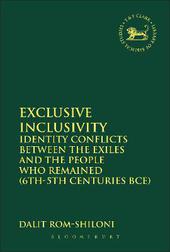
|
Exclusive Inclusivity: Identity Conflicts between the Exiles and the People who Remained (6th-5th Centuries BCE)
Paperback / softback
Main Details
| Title |
Exclusive Inclusivity: Identity Conflicts between the Exiles and the People who Remained (6th-5th Centuries BCE)
|
| Authors and Contributors |
By (author) Dr. Dalit Rom-Shiloni
|
| Series | The Library of Hebrew Bible/Old Testament Studies |
|---|
| Physical Properties |
| Format:Paperback / softback | | Pages:256 | | Dimensions(mm): Height 234,Width 156 |
|
| Category/Genre | Judaism - sacred texts |
|---|
| ISBN/Barcode |
9780567661500
|
| Classifications | Dewey:221.6 |
|---|
| Audience | | Tertiary Education (US: College) | |
|---|
| Illustrations |
10 illus
|
|
Publishing Details |
| Publisher |
Bloomsbury Publishing PLC
|
| Imprint |
T.& T.Clark Ltd
|
| Publication Date |
29 January 2015 |
| Publication Country |
United Kingdom
|
Description
The sixth and fifth centuries BCE were a time of constant re-identifications within Judean communities, both in exile and in the land; it was a time when Babylonian exilic ideologies captured a central position in Judean (Jewish) history and literature at the expense of silencing the voices of any other Judean communities. Proceeding from the later biblical evidence to the earlier, from the Persian period sources (Ezra-Nehemiah, Haggai, Zechariah, and Deutero-Isaiah) to the Neo-Babylonian prophecy of Ezekiel and Jeremiah, Exclusive Inclusivity explores the ideological transformations within these writings using the sociological rubric of exclusivity. Social psychology categories of ethnicity and group identity provide the analytical framework to clarify that Ezekiel, the prophet of the Jehoiachin Exiles, was the earliest constructor of these exclusive ideologies. Thus, already from the Neo-Babylonian period, definitions of otherness were being set to shape the self-understanding of each of the post-586 communities, in Judah (Yehud) and in the Babylonian Diaspora, as the exclusive People of God. As each community reidentified itself as the in-group, arguments of otherness were adduced to diregard and delegitimize the sister community. The polemics against "foreigners" in the Persian period literature are the ideological successors to the earlier ideological conflict.
Author Biography
Dalit Rom-Shiloni is Senior Lecturer of Hebrew Bible at Tel Aviv University, Israel.
|